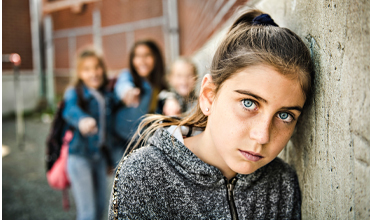In the movie “Mean Girls,” the ruling girl clique, known as “The Plastics,” reinforces its social standing by deliberately excluding and deriding other students. The movie is based on the nonfiction book “Queen Bees and Wannabes” by Rosalind Wiseman and illustrates the impact that intentionally cruel alpha girls can have on other girls. Wiseman defines mean girl behaviors such as backstabbing, manipulation and exclusion as forms of relational aggression. This type of bullying is non-physical, often carried out subtly and can be extremely confusing and painful for its victims.
High school isn’t the only place where the stereotypical “mean girl” can be found. In many schools, this type of behavior is now showing up as early as third grade. To complicate things further, beginning around fourth grade, kids naturally begin to pull away from their parents and start to place a higher importance on the opinions of friends. This biological drive prepares our children for adulthood, but it also makes them even more vulnerable to mean behavior.
What if your child finds herself on the receiving end of mean-girl social rejection? Should you step in to help or should you encourage her to work it out herself? Like many things in parenting, there is no one right answer. How you help your daughter navigate a mean girl will depend on many factors such as your daughter’s personality, how she is being affected by the aggression, her age and the strength of her other social connections.
How to support your daughter if she is a target of relational aggression:
Educate her
It can be very helpful for girls to learn that the aggression they are experiencing has a name and is something that commonly occurs among girls. Understanding that this is a widespread issue can help to depersonalize the experience. In addition, teaching your daughter that mean-girl behavior often stems from anxiety, fear and insecurity can give her a different lens through which to view what is happening.
Make sure she knows it’s not
her fault
Many victims of bullying internalize the experience. They believe that somehow they deserve the treatment and they feel intense shame. Many children do not want their parents to think less of them or to be disappointed in them, so they try to manage the pain themselves. It is important to stress to your daughter that she is valuable and loved and that your support of her will not waiver.
Teach her strategies
While your daughter may not always be able to make the mean girl’s behavior stop, giving her strategies to help will give her a sense of control. When physically possible, she should ignore the behavior and walk away. Mean girls are looking for a reaction when they fail to get one, they lose their sense of power. When it is not possible to physically leave the situation, teach your daughter to project confidence by keeping her voice strong and her head up to convey that what the bully is saying or doing is not having the intended effect.
Connect her with school and outside support
If your daughter is younger, speaking with her classroom teacher and making him or her aware of what is going on can go a long way toward helping your daughter feel supported. While mean girl behavior is often subtle and insidious, if the teacher is aware, he or she can keep a sharper eye out and can also structure activities to ensure that your daughter’s interactions with the mean girl are minimized.
Your child’s school counselor can also be an excellent resource. He or she will be very familiar with helping students navigate relational aggression and can meet with your child discreetly during school hours.
Finally, some children benefit from seeing an outside counselor. If you notice your daughter demonstrating signs of anxiety, depression, suicidal thoughts, self-harm or low self-esteem, it is important to take your observations seriously and to connect her with professional support.
Help her strengthen and
create friendships
Good friendships are one of the best mitigators against the painful effects of relational aggression. Encouraging your daughter to stay connected to her friends is an important way to support her as she weathers the storm. Having friends outside of school will allow her to shed her victim identity and get a break from her stress.
Keep an eye on online activity
These days, relational aggression often takes place online. Keep an eye on what your daughter is seeing and reading online and ensure that she is getting regular breaks from device time. It may be wise to take a complete break from social media if it is contributing to her distress.
Build her self-esteem
Support your daughter in exploring her natural talents and strengths. This will help her to feel good about herself, minimizing the negative impacts of the relational aggression that she is experiencing.
Ultimately, the most important thing you can do as a parent is to keep the lines of communication open. Check-in with your child regularly and pay attention to what she says as well as to her non-verbal cues. If your child believes that she has your support and feels safe coming to you to share her concerns, that is half the battle won.
Alison Bogle is a writer living in Austin with her husband and three children. A former fourth grade teacher, she now enjoys writing about children and education. You can also catch her talking about articles from Austin Family magazine each Thursday morning on FOX 7 Austin.
















